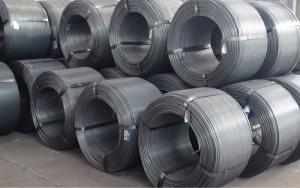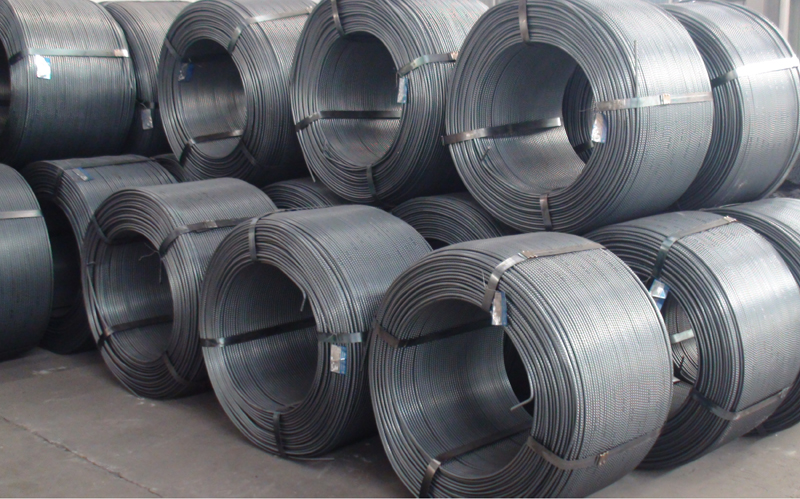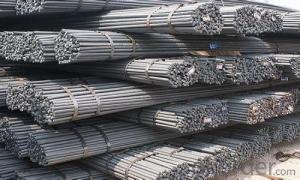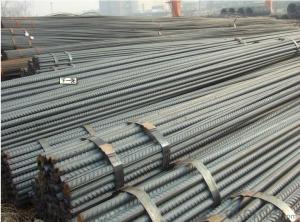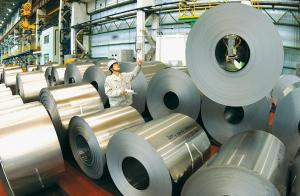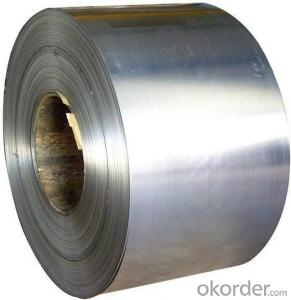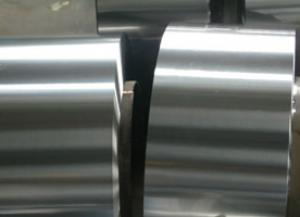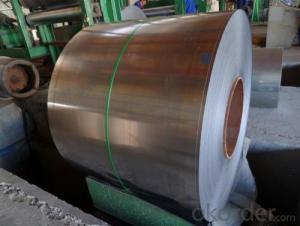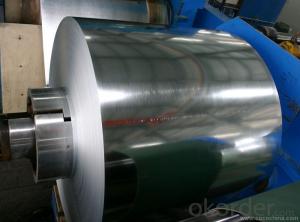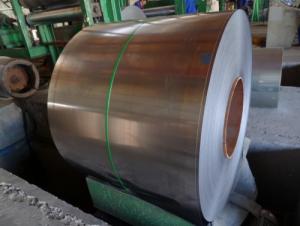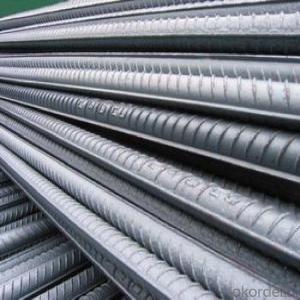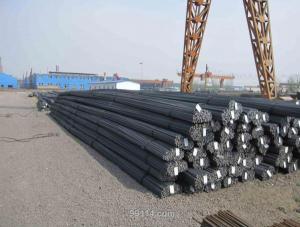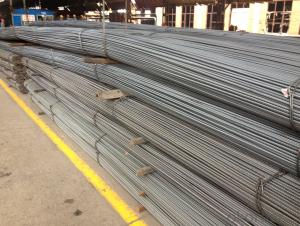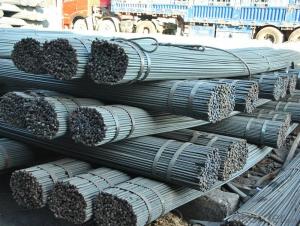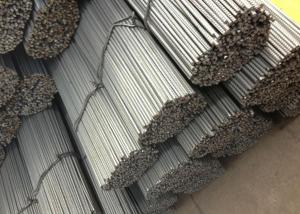Cold Rolled Rebar Coil CRB550
- Loading Port:
- China Main Port
- Payment Terms:
- TT OR LC
- Min Order Qty:
- -
- Supply Capability:
- -
OKorder Service Pledge
OKorder Financial Service
You Might Also Like
Grade | Size | Wire | Standard |
CRB550 | Diameter:5.5-12mm | Size:5.5-12mm | GB13788-2008 |
Length:2m-9m |
Packaging & Delivery of Hot Rolled Steel Rebar:
Packaging Detail: products are packed in bundle and then shipped by container or bulk vessel, deformed bar is usually naked strapping delivery, when storing, please pay attention to moisture proof. The performance of rust will produce adverse effect.
Each bundle weight: 2-3MT, or as required
Payment terms: TT payment in advance or Irrevocable LC at sight.
Trade terms :FOB, CFR, CIF
Label:to be specified by customer, generally, each bundle has 1-2 labels
Steel Rebar in stock
- Q: How do steel rebars affect the load-bearing capacity of concrete structures?
- Concrete structures greatly benefit from the use of steel rebars, as they play a crucial role in improving their load-bearing capacity. These rebars are embedded within the concrete to provide tensile strength, as concrete is known to be weak in tension. By reinforcing the concrete, rebars effectively distribute and bear the applied loads, ultimately enhancing the overall structural performance. The incorporation of steel rebars in concrete structures serves to resist cracking and prevent structural failure under various load conditions. When a load is exerted on a concrete structure, such as a beam or column, the rebars absorb the tensile forces generated by the load. This action safeguards the concrete from cracking and ensures the structure remains intact and stable. Furthermore, the utilization of rebars also enhances the flexural strength of concrete structures. Flexural strength refers to the capacity of a material to withstand bending forces. Through the reinforcement of concrete with rebars, the structure becomes more resistant to bending and can support heavier loads without experiencing excessive deflection or failure. Additionally, steel rebars play a pivotal role in enhancing the shear strength of concrete structures. Shear strength refers to the ability of a material to resist forces that cause one layer of the material to slide relative to another. By providing additional reinforcement, rebars strengthen the concrete against shear forces, thereby increasing the structure's resistance to lateral loads and preventing shear failure. In summary, steel rebars significantly bolster the load-bearing capacity of concrete structures by providing tensile, flexural, and shear strength. Their presence enables concrete structures to withstand higher loads, enhances their durability, and ensures their long-term structural integrity. Proper design and installation of rebars are imperative when constructing safe and structurally sound concrete buildings, bridges, and other infrastructure projects.
- Q: Can steel rebars be used in cold weather conditions?
- Yes, steel rebars can be used in cold weather conditions. Steel is known for its durability and strength, making it a suitable material for construction projects even in cold climates. However, it is important to take certain precautions when using steel rebars in cold weather. For instance, the rebars should be properly stored and protected from moisture to prevent rusting. Additionally, the concrete mix used with the rebars should be adjusted to ensure it can withstand freezing temperatures and avoid cracking. Overall, with proper planning and precautions, steel rebars can be effectively used in cold weather conditions.
- Q: What is the minimum concrete strength required for steel rebars?
- The minimum concrete strength required for steel rebars typically depends on the specific application and design requirements. However, it is common for construction projects to require a minimum concrete strength of 3,000 pounds per square inch (psi) for standard steel rebars.
- Q: Do steel rebars need to be coated with any protective materials?
- Yes, steel rebars often require a protective coating to prevent corrosion and extend their lifespan. Coatings such as epoxy, zinc, or galvanized coatings are commonly used to protect rebars from environmental factors and ensure their structural integrity in reinforced concrete structures.
- Q: How do steel rebars affect the overall durability of concrete?
- Steel rebars significantly improve the overall durability of concrete. By reinforcing the concrete, rebars enhance its tensile strength, preventing cracking and structural failure. They also provide resistance against shrinkage and expansion caused by temperature changes, ensuring the longevity and stability of concrete structures.
- Q: Can steel rebars be used in industrial construction projects?
- Yes, steel rebars can be commonly used in industrial construction projects. They provide structural reinforcement to concrete structures, enhancing their strength and durability. Rebars are widely used in various industrial applications such as bridges, factories, power plants, and high-rise buildings to ensure the structural integrity and safety of these projects.
- Q: How many patterns are there in threaded steel?
- There are two kinds of classification methods commonly used types of thread steel: one is to shape classification, according to different space shapes and transverse rib rib for classification or type, such as the British Standard (BS4449), the thread steel is divided into type I and type ii. This classification mainly reflects the tightening performance of the threaded steel. The two is the performance of classification (class), such as China's standard (G B1499), according to the strength (tensile strength yield point / steel) will be divided into 3 levels; the Japanese industrial standard (JI SG3112), according to the comprehensive performance of steel will be divided into 5 categories; the British Standard (BS4461) also, certain provisions of the grades of steel performance test thread. In addition, the thread steel can be classified according to the use, such as reinforced concrete, ordinary steel bars and reinforced concrete bars for heat treatment. Main uses: widely used in housing, bridges, roads and other civil engineering construction.
- Q: How do steel rebars affect the overall durability of a structure?
- The overall durability of a structure is greatly enhanced by the presence of steel rebars. These rebars play a crucial role in reinforcing concrete, contributing to the building's structural integrity and longevity. By distributing and withstanding tensile forces, they increase the load-bearing capacity of the structure. One of the primary advantages of steel rebars is their ability to resist cracking and prevent the propagation of cracks in concrete. Since concrete is weak in tension, introducing rebars helps absorb and distribute tensile stresses, reducing the likelihood of crack formation. This is particularly important in areas prone to seismic activity or other dynamic forces. Furthermore, rebars also exhibit excellent resistance to corrosion, which is a common threat to the durability of structures, especially those in coastal or humid environments. Typically, the steel used in rebars is treated with corrosion-resistant coatings or made from stainless steel, ensuring long-term protection against rust and deterioration. The inclusion of steel rebars in concrete structures also improves their resistance to fire. Steel has a high melting point, and when integrated into concrete, it acts as a heat sink, slowing down the spread of fire and allowing for additional time for evacuation and firefighting efforts. In conclusion, steel rebars greatly contribute to the overall durability of a structure by enhancing its resistance to cracking, corrosion, and fire. Their ability to reinforce concrete and withstand tensile forces ensures the structural stability and longevity of the building, making it more resilient to various environmental and man-made hazards.
- Q: How do steel rebars resist seismic forces?
- Steel rebars resist seismic forces in several ways. Firstly, their high tensile strength allows them to withstand the intense forces generated during an earthquake. Additionally, rebars are embedded within concrete structures, providing reinforcement and increasing the overall strength and stability of the building. The ductility of steel rebars also plays a crucial role as they have the ability to deform and absorb energy during seismic events, which helps prevent sudden collapse. Overall, the combination of strength, reinforcement, and ductility makes steel rebars an effective solution for resisting seismic forces and ensuring the safety of structures during earthquakes.
- Q: How are steel rebars used in pre-stressed concrete structures?
- Steel rebars are used in pre-stressed concrete structures to provide tensile strength and reinforcement. They are strategically placed in the concrete to counteract the forces that cause bending or cracking. By pre-stressing the rebars, the concrete structure becomes more resistant to external loads and can effectively bear heavy loads without deformation or failure.
Send your message to us
Cold Rolled Rebar Coil CRB550
- Loading Port:
- China Main Port
- Payment Terms:
- TT OR LC
- Min Order Qty:
- -
- Supply Capability:
- -
OKorder Service Pledge
OKorder Financial Service
Similar products
Hot products
Hot Searches
Related keywords
